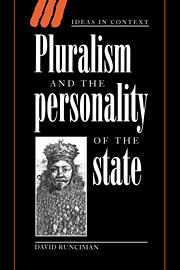Book contents
- Frontmatter
- Contents
- Preface
- PART I THE PERSONALITY OF ASSOCIATIONS
- PART II POLITICAL PLURALISM
- 5 Maitland and the real personality of associations
- 6 Figgis and the communitas communitatum
- 7 Barker and the discredited state
- 8 Cole and guild socialism
- 9 Laski and political pluralism
- 10 The return of the state
- PART III THE PERSONALITY OF THE STATE
- Bibliography
- Index
- Ideas in Context
5 - Maitland and the real personality of associations
Published online by Cambridge University Press: 10 November 2009
- Frontmatter
- Contents
- Preface
- PART I THE PERSONALITY OF ASSOCIATIONS
- PART II POLITICAL PLURALISM
- 5 Maitland and the real personality of associations
- 6 Figgis and the communitas communitatum
- 7 Barker and the discredited state
- 8 Cole and guild socialism
- 9 Laski and political pluralism
- 10 The return of the state
- PART III THE PERSONALITY OF THE STATE
- Bibliography
- Index
- Ideas in Context
Summary
In 1903 F. W. Maitland, the greatest legal historian in England, delivered the Sidgwick lecture at Newnham College under the title ‘Moral personality and legal personality’. His subject was the legal status of associations within the state, and also the legal status of the state itself, given that it too was an association, or ‘organised group’ as Maitland termed it. The question Maitland sought to address was whether such groups were to be considered to be persons in their own right. His lecture surveys the history of the law regarding associations, and also the theorising that went with it, in order to establish some of the difficulties which attached to the fiction theory that continental jurists had derived from Roman law. The view that groups were persons merely by a ‘fiction of law’ Maitland contrasts with what he calls ‘the morality of common sense’, which understands them to be something more. On the question of what that something might be, however, Maitland refuses to be drawn. ‘As to philosophy’, he announces at the conclusion of his talk, ‘that is no affair of mine’. It belonged to others ‘to tell us of the very nature of things and the very nature of persons’. All it behove a ‘mere lawyer’ to recognise was that ‘if n men unite themselves in an organised group, jurisprudence, unless it wishes to pulverise the group, must see n + 1 persons’.
- Type
- Chapter
- Information
- Pluralism and the Personality of the State , pp. 89 - 123Publisher: Cambridge University PressPrint publication year: 1997

